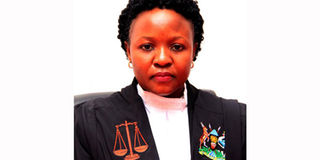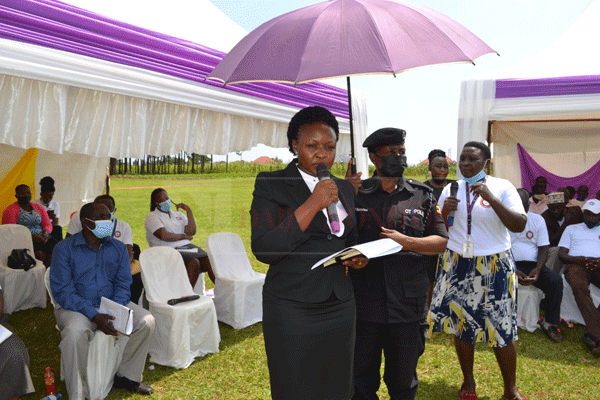Prime
Take up strategic positions in the Judiciary – Langa

What you need to know:
Sarah Langa Siu is a woman of firsts. She is first youngest chief registrar to the Judiciary. She is the first female registrar in the history of the Judiciary to assist the Chief Justice swear in the President. She is also the only female among the five-member team – driving the transformation agenda of the Judiciary. She shares her career milestones.
What prompted you to study law?
I am not sure what prompted me to study Law, but I recall that even as a student, I always played the role of an advocate in school dramas. I knew from the popular narrative that lawyers were intellectuals, they were smart and earned sufficient income from their work.
However, my peers convinced me not to apply for law because it is was presumed to be a ‘difficult course’ and instead I got admitted in Makerere University for a different course. When my sister who was my sponsor heard that I had chosen a different course, she intervened and insisted that I switch courses and go for Law.
I joined the Law School at Makerere University in 1999 and it turned out to be one of the best decisions I have ever made in my life.
In your 17-year career as a judicial officer, what is your experience in handling cases involving high profile people?
In adjudicating cases, the guiding principle has been to uphold the judicial oath that I swore upon appointment: To administer justice to all without fear, favour, ill will or affection.
I have worked both in Kampala and in upcountry stations.I have heard cases, written judgments or rulings and delivered them. Sometimes this involves a conviction, which could result in the convict being sent to jail.
I have handled many low and high profile cases, especially during the seven years I spent at the Anti-Corruption Court, where I was one of the pioneer magistrates.
While there, I handled the pre-committal processes of high profile cases such as the Commonwealth Heads of Government Meeting (CHOGM) case involving the former vice president Gilbert Bukenya; the bicycle scam involving John Kashaka Muhanguzi, former Permanent Secretary and other high ranking officers of the Ministry of Local Government.
I also handled the pension scam involving Mr Jimmy Lwamafa, the then Permanent Secretary, Ministry of Public Service and other officers from that Ministry.

Langa (right) is the first female chief registrar in Uganda to assist the Chief Justice in swearing the President. PHOTO/courtesy.
These were high-profile cases given the personalities and sums of money involved. It is not surprising these cases attracted the attention of the public and the media both locally and internationally.
The number of advocates in these cases were equally many as they involved some of the big names in town. Many people wondered how I was going to handle these unprecedented cases.
But the nature of cases was never an issue to me. Whether high or low profile cases, it is absolutely critical for a judicial officer to uphold the judicial oath, adhere to the judicial code of conduct, not take bribes, and know that God is the ultimate supervisor who not only sees everything we do but also provides guidance when we seek it from Him.
What challenges have you had as chief registrar?
The office of the chief registrar is a demanding one. It is the technical office of the Judiciary that comes fourth in the administrative hierarchy and is directly responsible for overseeing the lower bench. It is responsible for implementing all the judicial activities in the strategic plan and the policies of the Chief Justice, Deputy Chief Justice and the Principal Judge.
In addition, it is responsible for supervision of all the registrars and magistrates in the country, whose number currently stands at 378. The office is also the mouthpiece of the Judiciary. These multiple tasks mean there is a heavy work schedule.
But I constantly remind myself that I wanted this position and so I must work up to the expectations of my supervisors. Effective delegation has also been a great strategy for me.
I am also privileged to be part of a very supportive top management comprising the Chief Justice, Deputy Chief Justice, Principal Judge and Secretary to the Judiciary and registrars.
The work I do also involves implementing tough decisions, such as undertaking disciplinary actions on colleagues for example, interdiction, transfers and deployments.
But I have realised that such decisions can be communicated with empathy. Counselling and a listening ear are very important. So, I provide support, encouragement and reassurances.
In addition to my professional role, I am a wife, a mother, a sister, a friend, a member of a church. These roles are equally demanding. Thankfully, I have a supportive husband and family. My husband often reminds me that he released me to serve this country, and I find that so reassuring.
I have since learnt that I may not achieve 50-50 balance of work and life but the important thing is to ensure that my family understands me.
It is critical to know family expectations and integrate them with work. Overall, it takes resilience, courage, wisdom and the grace of God.
It sounds tough. Have you registered any highs?
My appointment as the youngest chief registrar of the Judiciary at 40 years is one of my career highlights. On May 12, last year, I was honoured to be assigned the first female chief registrar in Uganda to assist the Chief Justice in swearing the President. The role of the chief registrar in such a ceremony is very critical. The chief registrar presents the Bible and the oath of allegiance to the President – elect and he takes oath.
The same procedure is followed for the oath of office. After which, the chief registrar guides both the President – Elect and the Chief Justice on where to sign on the Oath of Allegiance and Oath of Office. Thereafter, the Chief Registrar presents instruments of power to the Chief Justice, who in turn presents them to the President.
The instruments of power are the Constitution; the National Flag; the Presidential Standard Flag; the National Anthem; the National Court of Arms and the Public Seal. I am also privileged to be part of the pioneer top management team – the only female among the five-member team – driving the transformation agenda of the Judiciary.
Following the enactment of the Administration of the Judiciary Act, 2020, the Judiciary attained its proper identity and status as an arm of government and not a department under the Ministry of Justice and Constitutional Affairs.
What achievements have been registered by the Judiciary so far?
An expanded Judicial structure that will see the coverage of courts extend widely across the country; enhanced budget allowing for more sessions in the courts as we strive to eliminate case backlog. I am optimistic that we shall achieve the Chief Justice’s vision of timely justice and reduce case backlog from 24 months to 12 months.

Another high in my career was in 2009, when I was appointed as a pioneer magistrate at the then newly established Anti-Corruption Division. I was among the three magistrates posted to that Court and I became the longest serving judicial officer among my cohorts at the Anti-Corruption Division, serving there for seven years, and growing through the ranks to Chief Magistrate and Deputy Registrar. Receiving the Chief Justice’s award for outstanding performance during the time I was working at the Anti-Corruption Division was a memorable moment for me.
If you had an opportunity to mentor women, what would you tell them?
I want to see women take up more strategic leadership positions in the Judiciary, including that of the Chief Justice and Principal Judge. In other arms and departments of government; for example, we have seen a female Speaker of Parliament and currently Uganda has a female Director of Public Prosecutions, among others. I pray that someday, we can have a female Chief Justice. Kenya has one and Ghana has had one.
People say law is no longer the lucrative profession it used to be. Would you still advise anyone to study Law in this day and age?
Law is still a noble and satisfying profession. It presents an opportunity to be a voice for the voiceless in the various areas of practice for example as a judicial officer, prosecutor or private advocate. There is nothing as satisfying as administering justice to a litigant.
However, it is important for children to be given sufficient information progressively from a young age about Law as a course so that they can evaluate if that aligns with their abilities and nurture interests.
The profession, like others has not been without challenges such as unethical conduct, indiscipline, and moral decay, but it remains a prestigious profession.
Are the numbers for women in the legal profession increasing?
Right now in the Judiciary, we have almost an equal number of female judicial officers as male judicial officers standing at 47.3 percent to 52.7 respectively.
And among registrars, there are more women, and there is no evidence that female lawyers are performing poorly compared to males. So women should not fear to aspire to study law and parents and sponsors too should change their negative perceptions.
Also, a Law degree and the post graduate diploma are not impossible to pass as long as one remains focused. Third, law is no longer a precarious job for females as some people used to believe. Law is a satisfying profession for women if practiced with integrity. A great legacy can be achieved.
I am aware of the challenges the girl-child faces such as parental neglect, discrimination in society and family, and high levels of sexual abuse arising out of the Covid-19 pandemic resulting in teenage pregnancies.
But these should not bar any girl child from pursuing law. With schools open now, I encourage the girl child to pick up her pieces, return to school, and take advantage of the available support mechanisms and study.
What do you do when you are not doing legal work?
I attend to family and friends, undertake church activities such as pre-marital counselling and mentorship of young people. I also find some time to visit family in the countryside and the farm.
Titbits
Langa has served in most of the ranks in the lower bench such as deputy registrar, chief magistrate, senior principal magistrate and magistrate Grade 1. She is an alumnus of the International Leaders Programme, UK 2016 and has served as chairperson of the Judiciary Contracts Committee 2017-2020. She also chaired the Justice Law and Order Sector (JLOS) Accountability Sub-Committee under the Human Rights and Accountability Working Group 2015-2017. In 2015, she was awarded a certificate of appreciation for outstanding performance by the then Chief Justice. She holds a Master’s degree in Law, a post graduate diploma in Public Administration and Management, a post graduate diploma in Legal Practice and a bachelor’s degree in Law. She is a member of the Uganda Judicial Officers Association- and National Association of Women Judges.





